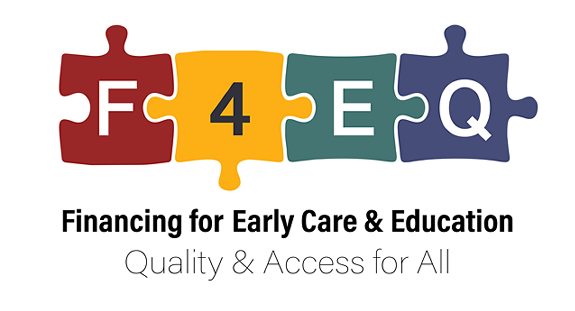Survey on Financing ECE & Head Start


The first national survey of early care and education financing policy and practice
This survey will help identify common program financing strategies for early care and education (ECE) and explore the state policy contexts under which programs make financing decisions.
Are you a state ECE administrator?
We have asked those in ECE administrative roles in all 50 states and Washington, D.C., about their office’s financing policies and practices. This web-based survey will ask you questions about your state’s ECE funding system(s), how your state makes funding decisions, any collaborations you may have around coordinating funding, supports you receive and provide to providers around financing, and your beliefs about ECE funding. Preview the state administrator survey (PDF).
Are you a Head Start program director?
We have asked all Head Start program directors across the country to tell us more about how they pay for the full cost of providing care. This web-based survey will ask questions about your program’s funding source(s), how your program makes funding decisions, technical assistance support you receive about financing, any collaborations you may have around coordinating funding, and your beliefs about ECE funding. Preview the Head Start program director survey (PDF).
Learn More about the Study
Amid the movement in early care and education (ECE) to improve quality and meet the needs of families, children, and the workforce, many ECE system and program leaders combine, or coordinate, multiple funding sources to meet the total cost of delivering high-quality programming.
The implementation of coordinated funding may have critical implications for program quality, workforce strength, and equity in access and outcomes for young children and their families. At the same time, the decision to coordinate funding—and the ability to do so well while meeting all funding source requirements—is made within the context of and might be influenced by factors at different levels of the ECE system. Yet there is limited evidence about the national prevalence of coordinated ECE funding, the policies that encourage or inhibit coordinating funding, or the strategies used for coordination at local or state levels.
This study will provide a national picture of the extent to which and how Head Start programs bring together federal, state, and local funding sources to provide high-quality, comprehensive early care and education. It will also offer new information about the state policy contexts in which Head Start programs make those decisions. Your participation in this study will help policymakers make informed decisions about ECE funding.
Start the Survey
Ready to begin? Navigate to the survey using the link or QR code provided for your role. You will need the PIN you received in your email and letter invitations to start the survey.
State ECE Administrators
Head Start Program Directors
Have a Question?
If you still have questions after reading the FAQ below, or if you have trouble initiating the survey, please contact us:
Study Partnership
This study is funded by the Office of Planning, Research and Evaluation (OPRE) of the Administration for Children & Families, part of the U.S. Department of Health & Human Services.
NORC is conducting this study in partnership with Start Early, The Children’s Equity Project at Arizona State University, and independent consultant Margie Wallen.
FAQ
NORC at the University of Chicago (NORC) is conducting this study. NORC is an independent, nonpartisan research institution that helps federal agencies, decision-makers, and nonprofits make better decisions through data and analysis. For more information about us, please visit www.norc.org.
You may have already responded to the National Survey of Early Care and Education (NSECE), which NORC also administers every few years.
This survey is a part of a separate study and is not related to the NSECE.
The Office of Planning, Research, and Evaluation (OPRE) in the Administration for Children and Families (ACF) within the Department of Health and Human Services (HHS).
The study is being conducted by NORC at The University of Chicago, with support from their partners at Start Early, The Children’s Equity Project at Arizona State University, and independent consultant Margery Wallen.
For state ECE administrators, this survey will take about 30-40 minutes to complete.
For Head Start program directors, this survey will take about 45-50 minutes to complete.
Within each state and Washington, D.C., we have contacted the lead administrator for a state’s Child Care and Development Fund (CCDF), largest state pre-k program (if applicable), and Head Start Collaboration Office.
All Head Start program directors have been asked to complete this survey. This is called a “census” survey.
Your participation will help the nation’s policymakers and ECE administrators get a clearer picture of ECE financing policy and practice.
Yes! We would like to hear from all Head Start programs, regardless of how many funding sources they use.
We are happy to offer gift card tokens of appreciation for your time. You will be prompted at the end of the survey to select your gift card. You may refuse this token of appreciation if you are unable to accept it.
State administrators will receive a total of $35 for the ~30-40 minute survey.
We are happy to offer gift card tokens of appreciation for your time. You will be prompted at the end of the survey to select your gift card.
Head Start program directors will receive a total of $50 for the ~45-50 minute survey.
Answers that could identify you or your program/office in any way are separated from your other responses. Survey findings are put into summary reports that contain no names or other identifying information. Your name or any identifying information will never be released to the public.
To further protect your personally identifiable information (PII), we have obtained a Certificate of Confidentiality from the National Institutes of Health. This certificate strictly limits or prohibits forced disclosure of identifiable and sensitive research information to anyone not connected to the research except when the participant voluntarily consents or in a few other specific situations. For example, we cannot disclose your PII to a court without your consent. However, we still must follow federal, state, or local reporting requirements. For example, reporting child and elder abuse, some communicable diseases, and threats to harm yourself or others.
For Head Start programs, data will not be used for monitoring purposes. Your responses will not impact ACF funding for your program.
NORC will securely maintain the data from this study. At the conclusion of the study, the data will be archived for potential research use by others without any identifiable information included. The data may be linked to administrative data such as the Program Information Report (PIR) or Head Start Enterprise System (HSES). This will help further the field’s understanding of coordinated funding models within Head Start programs.
NORC telephone interviewers will identify themselves with their first and last name, as well as the name of the project or sponsor, the purpose of their call, and ask to speak with a specific person. When leaving a voicemail or message on an answering machine, the NORC telephone interviewers will leave specific information, including the study name and a toll-free telephone number for that particular study.

